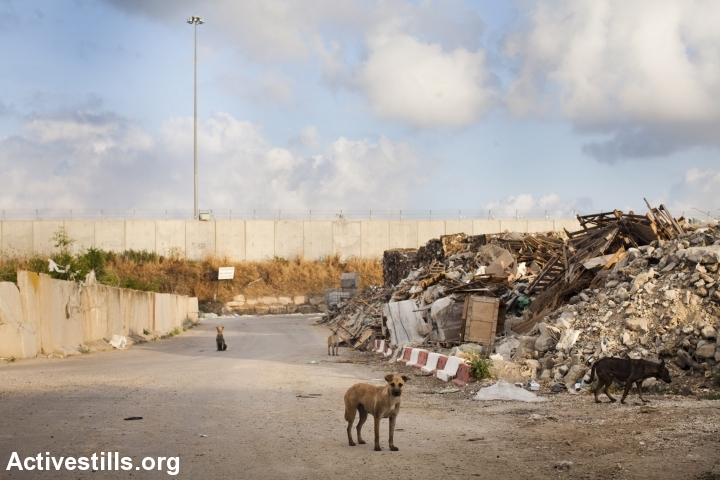National Labor Court rules that unlike their fellow Israeli workers, Palestinians in a no-man’s land industrial zone will remain subject to the Jordanian labor laws of 1967.
Israel’s National Labor Court rejected an appeal by Palestinian workers from the Nitzanei Shalom Industrial Zone this past Sunday, ruling that they will continue to be subject to the Jordanian labor laws of 1967, rather than Israeli laws.
The three appellants — Abdel Hamid Yahiye, Ahmed Shayib and Mujhad Harsha — sued their former employers in Tel Aviv’s Regional Labor Court in 2010 after they were fired for demanding retroactive payment from their employer. The regional court rejected the suit, and the three — with the help of Attorney Ehud Shiloni and the workers’ rights group, WAC-MAAN — appealed to the National Labor Court.
In a two-page ruling, the judges of the National Labor Court established that the industrial zone, which borders Tulkarem, is not part of an Israeli settlement, but rather is located in “no-man’s land” and was established to promote “economic cooperation between Israelis and Palestinians, and the employment of Palestinians.”
The ruling allows the state to discriminate against Palestinians in three ways: first vis-a-vis their peers and superiors at the factory; once vis-a-vis the Palestinian workers in nearby Tulkarem, who are subject to Palestinian labor laws; and once vis-a-vis workers in Jordan, whose labor laws are far more progressive than the ones established in 1967. The only workers who will continue to be subject to the old, draconian Jordanian laws are the Palestinian workers of the industrial zone.
According to the judges, the workers’ contracts clearly state that they will be subject to the Jordanian law, and that Israeli workers in the factory work in maintenance and security — positions that “cannot be compared to those of the appellants.”
The old Jordanian laws do not require employers to pay pensions, nor does they force employers to compensate workers for sick leave after the third day of absence, while providing only minimal vacation days and low severance packages.
In 2007 Israel’s High Court ruled, after 40 years of military rule in the occupied territories, that Israel’s labor laws will apply to Palestinians who work in the settlements. In the “Givat Ze’ev” ruling, the nine justices decided unanimously that because the employers and the workers never formally agreed which labor laws they will follow; and because the settlements constitute “legal enclaves” of Israeli law; and because the labor laws were written in Hebrew, taxes are paid to Israel, the currency is Israeli and Israeli laborers work alongside Palestinian ones under Israeli law — Palestinians can no longer be employed under Jordanian law. According to the National Labor Court’s ruling, however, the situation in Nitzanei Shalom is inherently different than that of Givat Ze’ev’s.
What is ‘consent,’ after all?
The National Labor Court’s ruling is nothing less than infuriating. The judges speak of “cooperation” that resembles nothing of the sort. Like Idan Landau wrote in an article on Nitzanei Shalom last year [Hebrew], only Israelis are allowed to open factories there, while Palestinians fill the role of the laborers.
The judges further noted that “the sides consented to the validity of Jordanian law.” As if Palestinian workers, who cannot find work in Tulkarem or obtain work permits in Israel or the settlements, are in a position in which they can negotiate and “consent” to something different than what the Israeli employer dictates.

After all, the entire idea underlying labor laws is to enshrine the basic rights to which every worker is entitled, without his or her ability to negotiate or consent.
These conditions are not up for discussion. A worker cannot consent to work for below minimum wage or give up on sick days — these are the protections the state affords him/her. But in Nitzanei Shalom (“Buds of Peace” in Hebrew), the judges allow the workers to “choose” one law — worse than any other law — which does not apply anywhere else.
All this despite the fact that Nitzanei Shalom is guarded by the Israeli army, pays taxes to Israel, and abides by the Israeli fire code. If the Palestinian workers there commit a crime, they are tried according to Israeli law in an Israeli court.
“The decision of the court leaves the Palestinian workers in the Nitzanei Shalom Industrial Zone in a legal limbo,” said WAC-MAAN head Assaf Adiv of the decision. “The Israeli labor courts do not provide them with any assistance, and there are no courts that will rule according to Jordanian law.”
Rubber-stamping the occupation
People will often claim that there is no “occupation,” and that this land is ours because we inherited it from our forefathers, or because we won the war, etc. But stories like this one remind us that, above all, that the occupation is about human beings.
Human beings who live under a military regime and who are subject to one set of rules, while the Chosen People living across the street are subject to a different set of laws. Human beings who cannot vote for the bodies and authorities that rule them, cannot take part in planning and building their own villages or towns, people who are tried in courts that do not represent them. The occupation is also an economic enterprise that has prevented Palestinian economic development for nearly 50 years, and which produces workers who can be exploited in horrible conditions, whether in the settlements, Israel proper or in twilight zones such as Nitzanei Shalom.
This article was first published in Hebrew on Local Call. Read it here.



